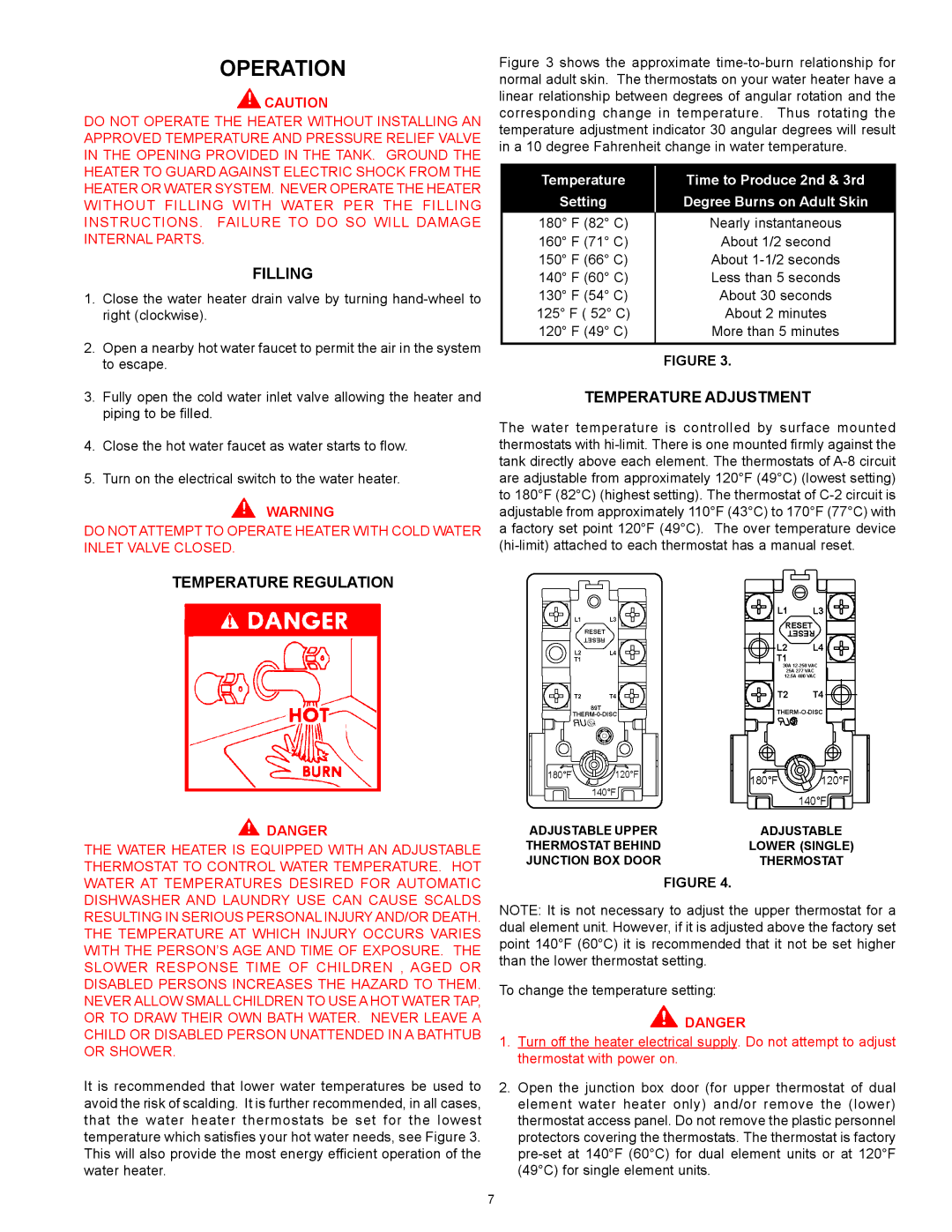
OPERATION
![]() CAUTION
CAUTION
DO NOT OPERATE THE HEATER WITHOUT INSTALLING AN APPROVED TEMPERATURE AND PRESSURE RELIEF VALVE IN THE OPENING PROVIDED IN THE TANK. GROUND THE HEATER TO GUARD AGAINST ELECTRIC SHOCK FROM THE HEATER OR WATER SYSTEM. NEVER OPERATE THE HEATER WITHOUT FILLING WITH WATER PER THE FILLING INSTRUCTIONS. FAILURE TO DO SO WILL DAMAGE INTERNAL PARTS.
FILLING
1.Close the water heater drain valve by turning
2.Open a nearby hot water faucet to permit the air in the system to escape.
3.Fully open the cold water inlet valve allowing the heater and piping to be filled.
4.Close the hot water faucet as water starts to flow.
5.Turn on the electrical switch to the water heater.
WARNING
DO NOT ATTEMPT TO OPERATE HEATER WITH COLD WATER INLET VALVE CLOSED.
Figure 3 shows the approximate time-to-burn relationship for normal adult skin. The thermostats on your water heater have a linear relationship between degrees of angular rotation and the corresponding change in temperature. Thus rotating the temperature adjustment indicator 30 angular degrees will result in a 10 degree Fahrenheit change in water temperature.
Temperature | Time to Produce 2nd & 3rd |
Setting | Degree Burns on Adult Skin |
180° F (82° C) | Nearly instantaneous |
160° F (71° C) | About 1/2 second |
150° F (66° C) | About |
140° F (60° C) | Less than 5 seconds |
130° F (54° C) | About 30 seconds |
125° F ( 52° C) | About 2 minutes |
120° F (49° C) | More than 5 minutes |
|
|
| FIGURE 3. |
TEMPERATURE ADJUSTMENT
The water temperature is controlled by surface mounted thermostats with
TEMPERATURE REGULATION
![]() DANGER
DANGER
THE WATER HEATER IS EQUIPPED WITH AN ADJUSTABLE THERMOSTAT TO CONTROL WATER TEMPERATURE. HOT WATER AT TEMPERATURES DESIRED FOR AUTOMATIC DISHWASHER AND LAUNDRY USE CAN CAUSE SCALDS RESULTING IN SERIOUS PERSONAL INJURY AND/OR DEATH. THE TEMPERATURE AT WHICH INJURY OCCURS VARIES WITH THE PERSON’S AGE AND TIME OF EXPOSURE. THE SLOWER RESPONSE TIME OF CHILDREN , AGED OR DISABLED PERSONS INCREASES THE HAZARD TO THEM. NEVER ALLOW SMALL CHILDREN TO USE A HOT WATER TAP, OR TO DRAW THEIR OWN BATH WATER. NEVER LEAVE A CHILD OR DISABLED PERSON UNATTENDED IN A BATHTUB OR SHOWER.
It is recommended that lower water temperatures be used to avoid the risk of scalding. It is further recommended, in all cases, that the water heater thermostats be set for the lowest temperature which satisfies your hot water needs, see Figure 3. This will also provide the most energy efficient operation of the water heater.
ADJUSTABLE UPPER | ADJUSTABLE |
THERMOSTAT BEHIND | LOWER (SINGLE) |
JUNCTION BOX DOOR | THERMOSTAT |
FIGURE 4.
NOTE: It is not necessary to adjust the upper thermostat for a dual element unit. However, if it is adjusted above the factory set point 140°F (60°C) it is recommended that it not be set higher than the lower thermostat setting.
To change the temperature setting:
![]() DANGER
DANGER
1.Turn off the heater electrical supply. Do not attempt to adjust thermostat with power on.
2.Open the junction box door (for upper thermostat of dual element water heater only) and/or remove the (lower) thermostat access panel. Do not remove the plastic personnel protectors covering the thermostats. The thermostat is factory
7
